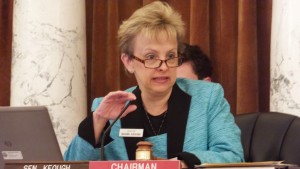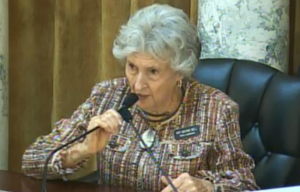In Shawn Keough’s 20th year in the Legislature, she’s also something of a newcomer.
This is her first session co-chairing the Joint Finance-Appropriations Committee, the powerful House-Senate panel that writes the state’s budget bills.

The Sandpoint Republican will have a leading role in deciding where Idaho spends some $3.3 billion in 2016-17. The discussions on teacher pay, school district funding and other K-12 line items will start in Keough’s committee.
Keough’s promotion reflects her legislative experience — she was honored earlier this year as the longest-serving female senator in state history — and reflects the respect she has earned from Senate leadership. But in her North Idaho legislative district — where Keough faces another contested GOP primary in May — her critics view the assignment differently. To them, it provides further proof that Keough is no conservative, but instead a lawmaker who has been in the Statehouse for too long.
‘Education Week’ awaits
Monday begins JFAC’s “Education Week,” as the 20 lawmakers hear budget presentations for public schools and the college and university system. State superintendent Sherri Ybarra will present her budget request on Jan. 28.
The numbers aren’t new to Keough, or to JFAC’s colleagues. Ybarra’s K-12 budget request was released in September; Gov. Butch Otter countered with his statewide budget on Jan. 11. The bottom line difference comes to less than $5 million. Otter is seeking a 7.9 percent increase for K-12, while Ybarra requested a 7.5 percent increase.
JFAC’s job is to take these two requests and come up with its own number. As the legislative branch’s budget-writers, JFAC members have considerable latitude to go their own way. In 2015, JFAC sided with Otter; the current $1.47 billion K-12 budget, a 7.4 percent increase from 2013-14, mirrored the governor’s request.
The first job for JFAC is to sort through the differences in the budget requests. Differences can be chalked up to perspective, Keough said. Otter has based his budget request on the far-reaching recommendations from his education task force, which met in 2013. Ybarra, elected more than a year later, has based her request on her own discussions with local school officials.
Either way, Keough is optimistic about the prospects for 2016. She expects her colleagues to have questions about the career ladder — the five-year plan to boost teacher salaries — but she believes her fellow senators are committed to continued funding.
A lengthy legislative resume
The wife of a retired school teacher, Keough brings an extensive political background to this year’s K-12 funding discussion:
- After the state launched the Idaho Education Network project, Keough was named to an oversight committee of lawmakers and school leaders. She doesn’t mince words about this assignment. She believes the IEN Program Resource Advisory Council amounted to mere window dressing, since state officials “misled” the committee about the depth of problems plaguing the statewide broadband system. The state shut down the network last year, after a district judge voided the $60 million broadband contract.
- During the 2015 legislative off-season, Keough served on a committee assigned to pick up the pieces from the Idaho Education Network collapse. The committee recommended the state stay the course — supporting local school districts as they cut their own deals on broadband.
- Keough spent the 2015 session on the Senate Education Committee. It turned out to be a one-year assignment, due to time constraints. Since JFAC holds hearings every morning, informal meetings with staff and agency heads get pushed back into the afternoon — conflicting with Senate Education’s daily 3 p.m. sessions.
And then there’s Keough’s JFAC experience. Keough joined the committee in 2001. Four years later, she was named a JFAC vice chair.

JFAC chairs and vice chairs have long worked as a quartet, says Rep. Maxine Bell, R-Jerome, the committee’s longtime House co-chair. That means Keough has had a direct role in crafting education budgets for years.
But as vice chair, Keough was in something of a holding pattern. Rupert Republican Dean Cameron was entrenched as Senate chair.
“I guess I kind of thought Sen. Cameron would be here forever,” Keough said. “I didn’t necessarily pine for the job.”
Circumstances changed in late May. Otter tapped Cameron, a 27-year Senate veteran, to head the state’s Department of Insurance.
Keough was next in line for the chair’s spot — and with Cameron’s resignation, she became the senior member of the Senate. However, she wasn’t assured of the promotion. It wasn’t until August when Senate President Pro Tem Brent Hill made the assignment official.
Keough downplays the wait. Senate Commerce and Human Resources Committee Chairman John Tippets also resigned in July to head the state Department of Environmental Quality, leaving Hill with two vacancies to fill.
“It wasn’t unusual to me at all,” she said. “He has 35 of us he has to corral.”
A contentious campaign season
Keough represents Idaho’s northernmost and perhaps most remote legislative district, bordered by Washington to the west, Montana to the east and British Columbia to the north.
And in legislative District 1 — Bonner and Boundary counties — the political terrain could be changing.
Keough has faced GOP primary opponents every year since 2008. In 2014, Keough defeated a conservative challenger, Danielle Ahrens, but captured only 54 percent of the vote. Ahrens had briefly planned to run again this year, but stepped aside earlier this month to clear the path for another challenger, Glenn Rohrer of Priest River.
Rohrer opposes Otter’s budget and wants Keough to fight for tax cuts. On his Facebook page, Rohrer tries to use Keough’s new legislative assignment against her. “In these trying economic times it is more critical than ever to elect a fiscal conservative,” Rohrer wrote last week. “My opponent has a long record of being a tax-and-spend liberal. Now that she chairs the Senate budget committee, no one’s wallet is safe.”
An anonymous website labels Keough a “Republican in Name Only,” and prominently features a stock photo of a wooden rocking chair. The name of the website is hardly subtle: retireshawnkeough.com.
The rhetoric concerns Bell. Serving her 28th year in the Legislature, she is the House’s senior member, and she refers to herself and Keough as “the two old babes.” It alarms her to hear Keough’s constituents lampoon her Statehouse experience, and dismiss her work on JFAC as a liability.
“It doesn’t help her, because frankly they have no respect for any of the process,” Bell said. “She is serving this session under considerably more duress than I wish she were.”
District 1’s political dynamics are complicated. The district’s first-term House members, Heather Scott and Sage Dixon, are aligned with the Legislature’s conservative wing.
Scott led the opposition to a bill to bring Idaho’s child support law into compliance with an international treaty; in May, Otter reconvened a one-day special session to pass the child support bill. (Keough supported the bill during the 2015 regular session, and in the special session.) Earlier this month, Scott and Dixon made headlines and took heat for touring Oregon’s Malheur National Wildlife Refuge, the site of an ongoing armed standoff.
Scott and Dixon told Idaho Education News they will not endorse in Keough’s primary. Two years earlier, Keough had endorsed in the House races — backing Stephen Snedden, who lost to Scott; and George Eskridge, a longtime House member and JFAC colleague, who lost to Dixon.
Keough says the three lawmakers work together on constituent issues, and she says she doesn’t view herself as an outlier. “I think we just represent different parts of our community.”
More answers will come in four months, when voters in Idaho’s closed Republican primary head to the polls. Keough says she’s unsure how the electorate will view her resume, and her position on JFAC.
“I’ll let you know on May 18.”
